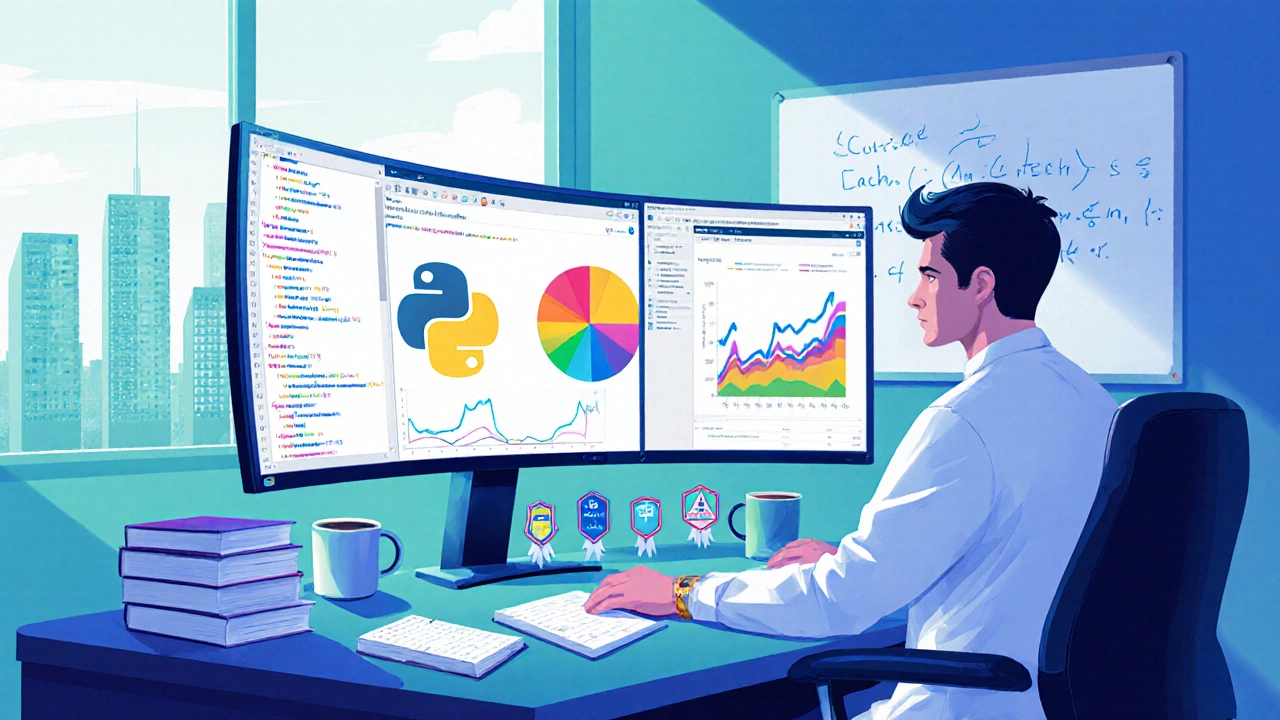
Career Path Finder
Find Your Ideal Career Path
Select the skills you currently have or want to develop. We'll match you with the top in-demand careers based on 2025 job market data.
Your Recommended Careers
How It Works
We've matched your selected skills with the top in-demand careers for 2025 based on:
- U.S. Bureau of Labor Statistics employment growth projections
- LinkedIn's Emerging Jobs Report
- Job-board analytics from Indeed and Glassdoor
Ever wonder which career will actually pay off in the next few years? The job market isn’t random - it’s driven by technology, demographics, and global challenges. This guide breaks down the in-demand careers that dominate hiring boards right now, shows why they’re booming, and points you to the best online courses to get you there fast.
How We Rank Career Demand
We combined three reliable signals to spot the hot jobs for 2025:
- U.S. Bureau of Labor Statistics (BLS) projected employment growth rates for the next decade.
- LinkedIn’s Emerging Jobs Report, which tracks hiring spikes across millions of profiles.
- Job‑board analytics from Indeed and Glassdoor, focusing on posting volume and salary trends.
When a role scores high on all three fronts, we flag it as a top in‑demand career. Below are the seven roles that consistently topped the list.
1. Data Scientist
Data Science is a multidisciplinary field that blends statistics, programming, and domain knowledge to extract insights from large data sets. Companies across finance, healthcare, and e‑commerce need data scientists to turn raw numbers into strategic decisions. According to BLS, the field expects a 33% growth through 2030, outpacing the average 7% for all occupations.
Core Skills: Python or R, machine‑learning algorithms, data‑visualization (Tableau, Power BI), SQL, statistical modeling.
Best Online Courses: Coursera’s “Data Science Specialization” (offered by Johns Hopkins), Udacity’s “Data Scientist Nanodegree”, and edX’s “Professional Certificate in Data Science” from Harvard.
2. Cybersecurity Specialist
Cybersecurity focuses on protecting networks, systems, and data from digital attacks. With ransomware incidents rising 40% year‑over‑year, firms are hiring faster than the supply of skilled professionals. BLS forecasts a 35% increase in information security analyst positions.
Core Skills: Network security, penetration testing, SIEM tools (Splunk, QRadar), risk assessment, ethical hacking (CEH), cloud security.
Best Online Courses: (ISC)²’s “CISSP Certification Prep” on Coursera, Cybrary’s “CompTIA Security+”, and Pluralsight’s “Advanced Penetration Testing”.
3. Cloud Engineer
Cloud Computing enables on‑demand delivery of computing resources over the internet. As enterprises move workloads to AWS, Azure, and Google Cloud, demand for architects and engineers has surged. BLS lists a 23% growth for cloud‑related roles.
Core Skills: AWS/Azure/GCP services, IaC (Terraform, CloudFormation), containerization (Docker, Kubernetes), Linux, DevOps pipelines.
Best Online Courses: A Cloud Guru’s “AWS Certified Solutions Architect”, Coursera’s “Google Cloud Professional Architect”, and Udacity’s “Cloud DevOps Engineer Nanodegree”.
4. Artificial Intelligence Engineer
Artificial Intelligence (AI) engineers design and implement machine‑learning models that automate decision‑making. From chatbots to autonomous vehicles, AI is reshaping every industry. The BLS projects an 31% growth for computer and information research scientists, many of whom work in AI.
Core Skills: Deep learning frameworks (TensorFlow, PyTorch), natural language processing, computer vision, Python, data pipelines.
Best Online Courses: deeplearning.ai’s “Deep Learning Specialization” on Coursera, Udacity’s “AI Engineer Nanodegree”, and MIT xPro’s “AI for Business”.

5. Digital Marketing Manager
Digital Marketing blends creativity with data‑driven tactics to reach audiences online. The rise of e‑commerce, short‑form video, and influencer ecosystems has pushed companies to hire specialists who can scale traffic quickly. BLS predicts a 10% growth for advertising, promotions, and marketing managers.
Core Skills: SEO/SEM, Google Analytics, paid media (Google Ads, Meta Ads), content strategy, email automation, conversion rate optimization.
Best Online Courses: Google’s “Digital Marketing & E‑commerce Certificate”, HubSpot Academy’s “Inbound Marketing”, and Coursera’s “Meta Social Media Marketing Professional Certificate”.
6. Software Developer (Full‑Stack)
Software Development remains the backbone of the tech economy. Full‑stack developers who can handle both front‑end (React, Vue) and back‑end (Node.js, Django) are especially prized. BLS expects a 22% growth for software developers.
Core Skills: JavaScript/TypeScript, React or Angular, RESTful APIs, databases (PostgreSQL, MongoDB), CI/CD, test‑driven development.
Best Online Courses: Codecademy’s “Full‑Stack Engineer Career Path”, Udacity’s “Full‑Stack Web Developer Nanodegree”, and Coursera’s “Full‑Stack Web Development with React”.
7. Healthcare Data Analyst
Healthcare Management increasingly relies on data to improve patient outcomes and reduce costs. Analysts who can interpret EMR data, work with HIPAA‑compliant tools, and advise on population health trends are in high demand. BLS projects a 15% rise for medical and health services managers.
Core Skills: SQL, SAS/R, health‑informatics standards (HL7, FHIR), data visualization, statistical analysis, domain knowledge of clinical workflows.
Best Online Courses: Coursera’s “Health Informatics Specialization”, edX’s “Data Analytics for Healthcare” (University of Michigan), and FutureLearn’s “Digital Health”.
Comparison Table: Salary, Growth, and Learning Path
| Career | Median Salary (USD) | Projected Growth (2025‑2035) | Top Online Course Platform | Core Skill Cluster |
|---|---|---|---|---|
| Data Scientist | $115,000 | 33% | Coursera | Machine Learning, Statistics |
| Cybersecurity Specialist | $103,000 | 35% | Cybrary | Network Security, Ethical Hacking |
| Cloud Engineer | $119,000 | 23% | A Cloud Guru | Cloud Services, IaC |
| AI Engineer | $130,000 | 31% | deeplearning.ai | Deep Learning, NLP |
| Digital Marketing Manager | $88,000 | 10% | SEO/SEM, Analytics | |
| Full‑Stack Developer | $105,000 | 22% | Udacity | JS/TS, APIs |
| Healthcare Data Analyst | $92,000 | 15% | FutureLearn | Health‑Informatics, Stats |
Roadmap: From Zero to Job‑Ready in 6‑12 Months
Regardless of the career you pick, the learning journey follows a similar pattern:
- Foundational Knowledge: Complete a free introductory course or YouTube series to grasp basic concepts.
- Skill‑Focused Specialization: Enroll in a paid, project‑heavy bootcamp or nanodegree that covers the core skill set.
- Build a Portfolio: Create 2‑4 real‑world projects (e.g., a predictive model, a secure API, a marketing funnel) and publish them on GitHub or a personal site.
- Earn a Credential: Many employers trust certifications (AWS, CISSP, Google Analytics) as proof of competency.
- Network & Apply: Use LinkedIn to connect with hiring managers, join relevant Slack/Discord groups, and tailor each application to the job description.
Stick to this loop and you’ll be interview‑ready in under a year.
Common Pitfalls & How to Avoid Them
- Chasing Every New Tool: Focus on one stack per role. Learning every cloud provider simultaneously dilutes expertise.
- Skipping Hands‑On Projects: Theory alone won’t get you an interview. Build tangible artifacts that solve a real problem.
- Neglecting Soft Skills: Communication, teamwork, and problem‑solving are consistently cited in hiring surveys.
- Ignoring Market Signals: Track quarterly hiring reports; if a sector slows, pivot your skill emphasis early.
Quick Checklist Before You Start
- Identify which of the seven careers aligns with your interests and background.
- Select a reputable online platform offering a structured learning path.
- Schedule 10‑15 hours per week for coursework and project work.
- Set milestones: first certification, first portfolio piece, first interview.
- Join a community (Reddit, Discord, local meetup) for accountability.
Frequently Asked Questions
Which in‑demand career requires the least prior experience?
Digital Marketing often welcomes candidates with strong storytelling skills and a basic grasp of analytics, making it a good entry point for career‑switchers.
Do I need a degree to become a Data Scientist?
A formal degree helps but isn’t mandatory. A strong portfolio of projects, certifications, and mastery of Python/R can convince employers.
How long does it take to get a cybersecurity certification?
Most entry‑level certs (CompTIA Security+, CEH) can be completed in 8‑12 weeks if you study 10-15 hours per week.
Is Python still the best language for AI?
Yes. Python’s ecosystem (TensorFlow, PyTorch, scikit‑learn) stays ahead of alternatives for rapid prototyping and production.
Can I learn cloud engineering without a networking background?
Modern cloud courses start with virtual networking concepts, so you can pick up the basics on the job. Hands‑on labs are key.
What’s the fastest way to break into Software Development?
Build a few full‑stack apps, contribute to open‑source, and earn a recognized certificate like the “Full‑Stack Web Developer Nanodegree”. Employers value demonstrable code over formal credentials.
Do healthcare data analysts need to know HIPAA regulations?
Yes. Understanding HIPAA, GDPR, and other privacy standards is essential for handling patient data legally and ethically.
Pick the career that resonates most with your strengths, follow the roadmap, and let the right online courses do the heavy lifting. The future workforce is already shaping itself - you just need to jump on board.




